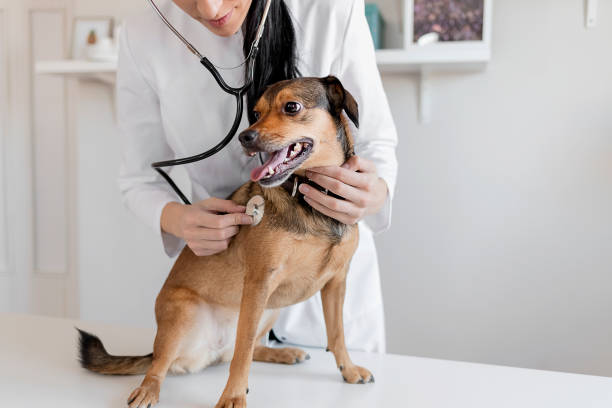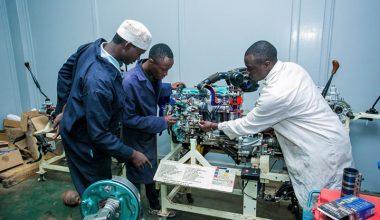Working with various animal species regarding their health requires a skill set that can only be acquired through appropriate education.
Students who desire to work in animal health have a variety of educational options. From certificate programs to master’s or doctoral programs, veterinary education starts at the certificate level.
If you want to help animals and contribute to Kenya’s wildlife preservation, you should choose veterinary courses in Kenya.
Animals need medical attention and relief from their illnesses anywhere in the world. Veterinarians possess the expertise to diagnose, treat, and prevent diseases in domestic or wild animals.
Table of contents
- About Veterinary Courses in Kenya
- Veterinary Course Requirements in Kenya
- List of Veterinary Courses Offered in Kenya Colleges and Universities.
- List of Universities Offering Veterinary Courses in Kenya
- #2. Egerton University
- #3. Kenya Animal Health Training Institutes (AHITIs)
- #4. Mount Kenya University (MKU)
- #5. Kabete National Polytechnic
- #6. Jomo Kenyatta University of Agriculture and Technology (JKUAT)
- #7. Chuka University
- #8. Kenya Methodist University (KeMU)
- School offering Diploma in Veterinary courses in Kenya
- Can I get an online veterinary course in Kenya?
- How much does it cost to study veterinary in Kenya?
- How long is the veterinary certificate course in Kenya?
- How much does a veterinarian earn in Kenya?
- Frequently Asked Questions
- Conclusion
- References
- Read Also
About Veterinary Courses in Kenya
The field of medicine known as veterinary medicine focuses on the illness, injury, and disease prevention, control, diagnosis, and treatment of animals. In Kenya, where agriculture is the primary industry, veterinary medicine plays a crucial role.
We will examine some of the best veterinary courses in Kenya and which schools you can enroll in to study them.
Veterinary Course Requirements in Kenya
The additional requirements for a diploma in animal health or veterinary medicine are a C+ in Physics, Chemistry, or Agriculture; a KCSE mean grade of C and a minimum of C-in Biology/Biological Sciences; a C–in Chem/Physical Sciences; a C-in Math/Agriculture; and a C-in Eng/Kiswahili.
The minimum entry requirement for a certificate course in animal health production is a KCSE mean grade of C- and a minimum of C- in Biology and Biological Sciences.
Certificate programs last two years, diploma programs last three years, and bachelor’s degree programs require four years.
Read Also: USIU Courses, Requirements, and Fees |2025
List of Veterinary Courses Offered in Kenya Colleges and Universities.
Veterinary medicine covers many courses and specialties, as seen below.
- Bachelor of Veterinary Medicine program
- Master of Veterinary Medicine
- Master of Veterinary Surgery
- Master of Veterinary Theriogenology
- Doctor of Philosophy degree in veterinary clinical studies
- Bachelor of Science (Animal Health and Production)
- Bachelor of Science (Animal Health Management Production Technology)
- Bachelor of Science (Animal Health Management)
- Bachelor of Science (Applied Animal Laboratory Science)
- Bachelor of Science (Dairy Science and Technology)
- Bachelor of Science (Dryland Animal Science)
- Bachelor of Science (Wildlife Enterprise and Management)
- Diploma in animal health and production.
- Diploma and certificate in animal health and production Diploma in animal health and range management.
List of Universities Offering Veterinary Courses in Kenya
Below are the top universities offering the best veterinary courses in Kenya.
#1. University of Nairobi (UoN)
The University of Nairobi is one of Kenya’s oldest and most prestigious institutions. It is home to the College of Agriculture and Veterinary Sciences, which has a dedicated Faculty of Veterinary Medicine.
The University of Nairobi plays a central role in training veterinarians who work both locally and internationally. It offers a Bachelor of Veterinary Medicine.
Veterinary Courses Offered
The University of Nairobi offers a wide range of veterinary courses in Kenya, with the Bachelor of Veterinary Medicine (BVM) being one of the most sought-after undergraduate programs.
The BVM program is a comprehensive five-year course designed to equip students with theoretical knowledge and practical skills in veterinary medicine.
The subjects covered include animal anatomy, pathology, surgery, and pharmacology, as well as clinical practice in animal hospitals and farms.
The University of Nairobi offers the Master of Veterinary Medicine (MVM) for postgraduate students with various specializations, such as epidemiology, small animal medicine, and food animal production.
Additionally, there are research-focused Ph.D. programs that allow students to delve into advanced areas such as veterinary pathology, microbiology, and epidemiology.
Unique Features
- State-of-the-art laboratories and animal hospitals for practical training
- Collaborations with international veterinary institutions
- Strong research culture in veterinary sciences
Read Also: 50+ Most Marketable Courses in Kenya | 2025
#2. Egerton University
Egerton University is well known for its focus on agricultural and animal sciences. Located in Njoro, the university offers programs that prepare students to work in the livestock and agricultural sectors.
Veterinary Courses Offered
Egerton University offers a Bachelor of Science in Animal Health and Production, which, while not strictly a veterinary medicine degree, provides foundational knowledge in animal care, health management, and disease prevention. The course is ideal for students who want to work in farm management or roles related to animal production and health.
Egerton University also offers postgraduate diplomas and master’s programs in areas like Veterinary Public Health and Animal Production.
These courses address the growing need for livestock production, disease control, and public health professionals, particularly in the agricultural and wildlife sectors.
Unique Features
- Strong emphasis on agriculture and livestock production
- Excellent fieldwork opportunities in Kenya’s diverse ecosystems
- Focus on integrating veterinary knowledge with sustainable agricultural practices
#3. Kenya Animal Health Training Institutes (AHITIs)
Kenya Animal Health Training Institutes (AHITIs) are specialized institutions that train animal health technicians and veterinary professionals. There are several AHITIs spread across the country, with the Kabete campus being one of the most renowned.
Veterinary Courses Offered
The AHITIs offer a Diploma in Animal Health and Production and a Certificate in Animal Health and Production programs.
These diplomas and certificate courses are designed to provide practical knowledge and skills needed to support veterinary professionals, particularly in rural areas.
Graduates of these programs often work as animal health assistants, helping with disease prevention and livestock management.
Unique Features
- Practical, hands-on approach to learning
- Targeted toward individuals interested in animal health at the community level
- Graduates can work in both the public and private agricultural sectors
Read Also: Chuka University Courses, Fees and Requirements
#4. Mount Kenya University (MKU)
Overview
Mount Kenya University is a fast-growing private university in Kenya. It offers a variety of health programs and applied sciences, including veterinary-related courses.
Veterinary Courses Offered
Mount Kenya University offers a Bachelor of Science in Animal Health and Production, which prepares students for roles in veterinary practice, livestock production, and health management.
The program includes practical work, field visits, and internships, ensuring students gain real-world experience in animal care and veterinary practices.
Unique Features
- A private institution with modern facilities
- Strong focus on entrepreneurship in the veterinary and agricultural sectors
- Internship and fieldwork opportunities
#5. Kabete National Polytechnic
Overview
Kabete National Polytechnic, formerly known as Kabete Technical Training Institute, is one of Kenya’s leading institutions for technical and vocational training. It offers courses in various fields, including animal health.
Veterinary Courses Offered
Kabete National Polytechnic provides a Diploma in Animal Health and Production geared toward students seeking practical skills in animal health management and livestock production. The course emphasizes hands-on training in disease control, farm management, and animal nutrition.
Unique Features
- Focus on technical and vocational training
- Emphasis on practical skills, making graduates highly employable
- Partnerships with local farms and veterinary practices for student placements
Read Also: 15+ Best ICT Courses in Kenya | Colleges, Fees and Requirements
#6. Jomo Kenyatta University of Agriculture and Technology (JKUAT)
Overview
Jomo Kenyatta University of Agriculture and Technology (JKUAT) is a leading public university known for its focus on agriculture, technology, and applied sciences. Located in Juja, near Nairobi, JKUAT has played a crucial role in advancing agricultural education in Kenya.
Veterinary Courses Offered
JKUAT offers a Bachelor of Science in Animal Health, Production, and Processing, which integrates veterinary principles with animal production and food processing technologies.
The course is designed to produce professionals who can manage animal health, ensure food safety, and contribute to livestock production.
Students are exposed to various aspects of animal health management, disease control, livestock breeding, and product processing, making them versatile in the animal and agricultural sectors.
Unique Features
- Strong focus on integrating animal health with food technology
- Access to cutting-edge agricultural research facilities
- Collaboration with local and international agricultural research centers
#7. Chuka University
Overview
Chuka University, located in Tharaka Nithi County, is a fast-growing public university with a strong agricultural and environmental sciences emphasis. Its programs are designed to address the needs of Kenya’s agricultural sector, including animal health and production.
Veterinary Courses Offered
Chuka University offers a Bachelor of Science in Animal Health and Production.
The program focuses on practical and theoretical knowledge in veterinary medicine, particularly in livestock health, disease prevention, and animal production.
The university also provides field training opportunities, during which students work directly with livestock to gain hands-on experience in veterinary practices.
Unique Features
- Field-based learning approach with strong community engagement
- Focus on animal health within the context of sustainable agricultural development
- Partnerships with local farms and veterinary organizations for internships
#8. Kenya Methodist University (KeMU)
Overview
Kenya Methodist University (KeMU) is a private university that has become one of Kenya’s most respected institutions for applied sciences. Located in Meru, KeMU has expanded its programs to include animal health, recognizing the growing need for veterinary professionals in Kenya.
Veterinary Courses Offered
KeMU offers a Bachelor of Science in Animal Health and Production, designed to provide students with knowledge in veterinary medicine, animal nutrition, and livestock management.
The program prepares students for roles in private and public sectors, including veterinary clinics, livestock farms, and research institutions. Graduates can also work in animal health policy, ensuring the well-being of animals through legislation and regulation.
Unique Features
- Emphasis on research and innovation in veterinary and agricultural sciences
- Modern facilities for practical training in animal health
- A holistic approach combining animal production, veterinary medicine, and environmental management
Read Also: Civil Engineering Courses in Kenya | 2025 Requirements and Fees
School offering Diploma in Veterinary courses in Kenya
Below are some schools offering a diploma in veterinary medicine or animal health and production.
- Mt. Kenya University
- Egerton University
- Chuka University
- Mt Kenya University(Nakuru)
- Barton College
- AHITI Kabete
- AHITI Ndomba
- AHITI Nyahururu
- Pwani University College
- Kisii University
- Kisii National Polytechnic
- Bukura Agricultural College
Can I get an online veterinary course in Kenya?
Yes, some universities and academies offer online veterinary courses in Kenya for interested students to learn from the comfort of their homes.
How much does it cost to study veterinary in Kenya?
Depending on your options, the total cost of studying veterinary medicine in Kenya might vary greatly, so prospective students should budget for tuition and living costs.
Summary of Costs:
- Undergraduate (Government-Sponsored): KES 30,000 – KES 50,000 per year
- Undergraduate (Privately Sponsored): KES 120,000 – KES 500,000 per year
- Diploma/Certificate Programs: KES 30,000 – KES 120,000 per year
- Postgraduate: KES 150,000 – KES 700,000 per year
- Additional Costs (Accommodation, Supplies, etc.): KES 70,000 – KES 150,000 per year
How long is the veterinary certificate course in Kenya?
The course is intended to run for two years and a total of 1,860 hours, including 270 hours spent in the field. Every course in the curriculum will be taught using the ISO teaching technique.
How much does a veterinarian earn in Kenya?
The salary range for most employees in the field of veterinarians is Ksh37,119 to Ksh155,087 per month through 2024.
At the beginning of their employment, veterinarians typically make between Ksh37,119 and Ksh110,682 net per month; after five years, this range drops to Ksh56,312 and Ksh187,061 per month for a 45-hour workweek.
Read Also: Masinde Muliro University Courses and Requirements | 2025 Fees Structure
Frequently Asked Questions
The University of Nairobi’s Veterinary Theriogenology MVetTherio (Master of Veterinary Theriogenology) program… The University of Nairobi’s Veterinary Pathology, Microbiology, and Parasitology MS (Master of Science)
A minimum of a C+ in the Kenya Certificate of Secondary Education (KCSE), with a C+ in Biology, Biological Sciences and Chemistry, and any of the following subjects: Agriculture, Mathematics, Physics, and Physical Sciences.
Yes, Egerton offers veterinary courses up to the Bachelor’s Degree level.
An average of 5 years for specialty and degree courses, while diplomas take an average of 2 years.
Conclusion
Animal rights protection and wildlife preservation are integral parts of Kenya’s efforts to boost its economy. The country has established institutions rooted deeply in the economy that offer the best technical and scientific knowledge in animal health.
Veterinary courses in Kenya provide a wide range of options one can specialize.
References
- List of veterinary courses offered in universities and colleges in Kenya – https://www.tuko.co.ke
- Veterinary Science courses in Kenya Universities and Colleges – https://tvet.co.ke
- kenyavetboard.or.ke – INSTITUTIONS APPROVED TO OFFER VETERINARY MEDICINE AND ANIMAL HEALTH COURSES






